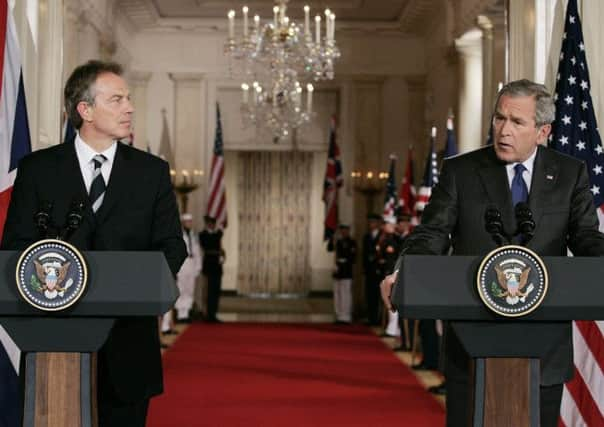Bush/Blair notes attributed to Chilcot delay


The former mandarin who has been running the inquiry into the Iraq War for six years said that he could not even send draft findings to witnesses who were being criticised until agreement was reached with the former prime minister and ex-US president to publish notes and correspondence between the two.
He noted that the process of reaching agreement “took considerable time”.
Advertisement
Hide AdAdvertisement
Hide AdHowever, Sir John told MPs on the foreign affairs select committee that he had succeeded “in overturning long-standing conventions on the publication of evidence” but added “this doesn’t happen overnight”.
He also revealed that the report would be accompanied by “a vast” amount of documentation saying at least 7,000 UK documents would be published alongside the report and stated that his committee had looked at 150,000 UK government documents.
His evidence came as it was revealed that Sir Martin Gilbert, a member of the Iraq inquiry panel, died last night.
Sir John said he wanted to pass on his “personal condolences” to Sir Martin’s family.
He added: “Martin was an extraordinarily eminent historian, and I and my colleagues and many others have benefited very much from the wisdom and insights that he was able to offer from his long and distinguished career. He was also a kind and generous colleague, and it was a privilege to have known him.”
As well as being a distinguished historian, Sir Martin was the official biographer of Sir Winston Churchill.
Sir John rejected suggestions that Sir Martin’s illness had held up the inquiry.
“Not in terms of the timing,” he said. “The loss is immeasurable, of course, but it has not affected the greater progress of the work of the inquiry”.
Advertisement
Hide AdAdvertisement
Hide AdSir John claimed that no witnesses “are trying to spin out the inquiry”.
But he warned: “We are not going to give people an indefinite amount of time”.
He said it had taken a long time to get agreement on correspondence between Mr Blair and Mr Bush and that the former head of the civil service Sir Jeremy Heywood had opposed publication initially.
Speaking about the exchanges between the two leaders, he told MPs: “Frankly, until we were able to establish agreement in principle on how much we could publish and disclose I was not ready to send even provisional drafts to witnesses who might be criticised because the way in which the evidence could support any criticism was absolutely critical. To do that we had to know what we would be able to get. And that took a considerable amount of time.”
Sir John identified as his top priority the task of providing those most deeply affected by the Iraq War with “the answers they deserve” but insisted it must not be rushed.
He said the report needed to be “based on evidence, fair and impartial”.
He said the panel wanted to deliver its findings “as soon as we possibly can” but renewed his assertion that he saw “no realistic prospect” of it being finished before May’s general election.
But he warned that he did not know when the report would be published.
Advertisement
Hide AdAdvertisement
Hide Ad“My committee and I want, and intend, to deliver our report to the prime minister as soon as we possibly can,” he said.
“But as I said to the prime minister I see no realistic prospect of doing so before the general election.”
In a lighter moment, Sir John was asked if he rued the day he accepted the job of leading the inquiry.
“I’ve tried very hard not to rue the day,” he quipped.
“May I put it this way – all of us are determined to get this thing done. None of us thought it would take this long.”
SNP Westminster leader Angus Robertson said: “It is now absolutely clear that Tony Blair’s attempts to delay and keep things under cover are key reasons we are in this endless wait for Chilcot to report.
“The Iraq War was a foreign policy disaster whose ramifications are still being felt today. Answers are long overdue and the continued delays to the publication are completely unacceptable.”
FOLLOW US
SCOTSMAN TABLET AND MOBILE APPS